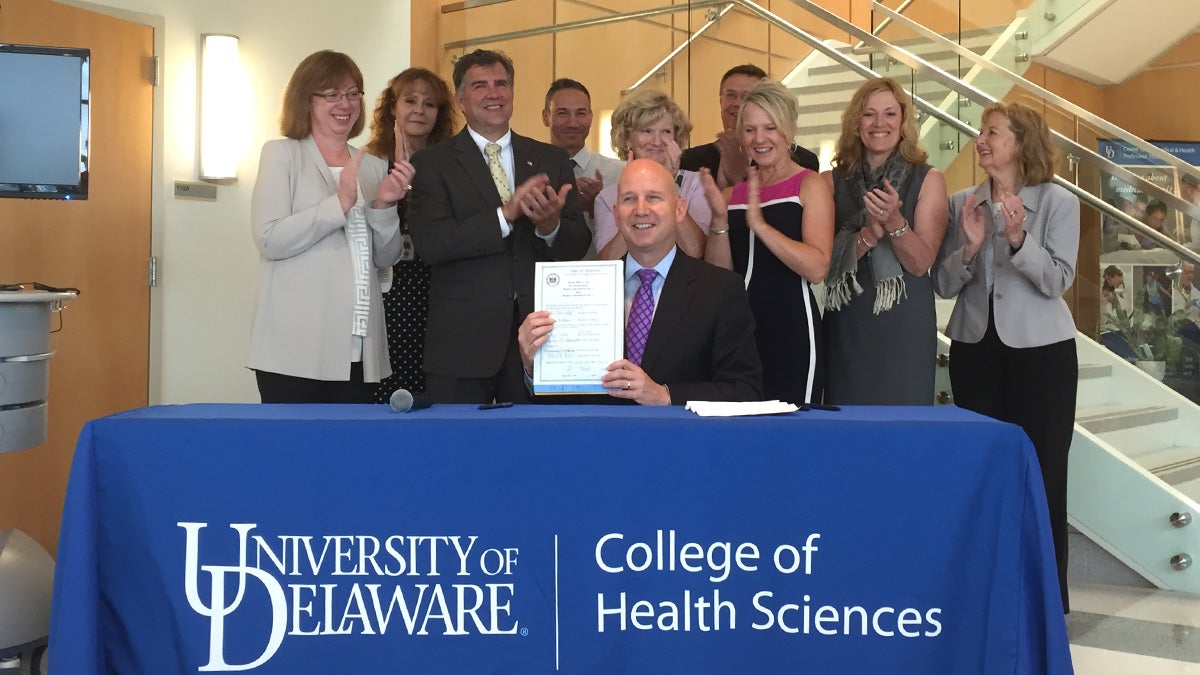Telemedicine to be covered by health insurance in Delaware

Gov. Jack Markell passed legislation Tuesday that will require health insurers to cover telemedicine care.
Marguerite Fleming Smith’s husband drove 3 hours in order for her to be treated for Parkinson’s Disease.
When Marguerite Fleming Smith’s husband Bill Smith was diagnosed with Parkinson’s disease in 2012, the Lewes couple had to drive three hours to see a specialist at the University of Pennsylvania.
During the long drive, the Smiths often faced snow, rain and traffic, and the side effects from Bill’s medication made it problematic for him to be trapped in a vehicle for an extended time.
So Smith enrolled in a research project at the University of Delaware’s Nurse Managed Health Center where he could see a specialist over video conference.
“Because he got to see her more frequently, every three months, he’s able to maintain his quality of life and do things with the grandkids and kids,” Marguerite Fleming Smith said.
Now, Smith and other Delawareans with various medical problems will be able to use what’s known as telemedicine through their health insurance coverage.
On Tuesday, Gov. Jack Markell, D-Delaware, signed a bill sponsored by Sen. Bethany Hall-Long and Rep. Bryon Short that will require private health insurers to reimburse for services delivered using telemedicine technologies.
The medical service currently costs patients an average $225 an hour, and patients might use the service anywhere between two and six times a year, depending on need.
“This is one really important tool in terms of providing more access to high quality care for people no matter where they live,” Markell said after the signing at the University of Delaware.
Rep. Short, D-Highland Woods, said the legislation is critical for patients who need help receiving the best care there is to offer.
“There are lots of challenges we still have before us as far as financial challenges in healthcare, but this legislation will be a big part of getting people to health care providers at a reasonable cost,” he said.
Individuals with medical conditions that affect their movement have struggled in the past to receive the fullest care, said Hall-Long, D-Middletown, who also is a public health professional and professor of nursing at the University of Delaware.
“You have individuals driving three or four hours to get care, and when they’re not physically able to move and be transported, pain increases, there are emergency room stays, it impacts costs, it really is a negative,” she said.
“This legislation provides one more tool in the toolkit to eliminate days of stay in the hospital, reduces emergency visits, improves the quality of life and reduces pain and suffering for many individuals.”
Dr. Ingrid Pretzer-Aboff, a University of Delaware professor and co-founder of its Parkinson’s disease clinic, said she has seen the full potential of telemedicine.
At the university, patients can see several specialists on site, as well as specialists from out of state via video that may be needed for specific types of care.
“This technology is there, it exists, we’re using it now and we could use it for really good reasons in health care,” Pretzer-Aboff said. “It’s not scary, it’s easy to use, it’s so important and it makes such a difference in people’s lives.”
WHYY is your source for fact-based, in-depth journalism and information. As a nonprofit organization, we rely on financial support from readers like you. Please give today.




